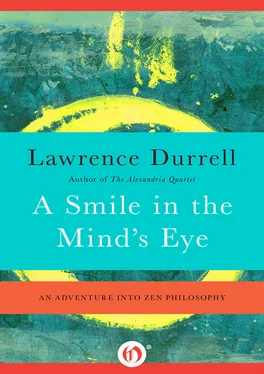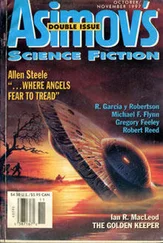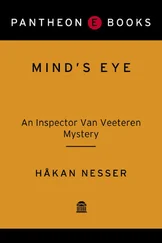Talking, arguing and eating thus in little bits we tackled the text piecemeal — there was so much to explain to me about the language of the original and the attitude of its ancient therapists. Behind the whole science lay a theory of fulcrum and realization which made the Buddhist adventure — even the Indian — one of the most extraordinary intellectual forays into the unknown. In the world of living things devoted to preying upon one another — and full of the savage defence mechanisms engendered by fear — the Buddhist proposed to make himself ever more defenceless against fate, thus unlocking the karmic spring, ‘the will power of desirelessness’ in E. Graham Howe’s phrase, which in fact modified his field of action by submission. To move thus towards the moon of his non-being, rolling with the punch, so to speak, he found an inner mechanism which ensured that he came back into his fair course at last by the law of the opposites. But all this to us was apparently going against the laws of evolution and causality as they seemed to be constituted in the theories of the survival of the fittest. Was the law of the jungle now what we had been led to believe? It was as if the yogi wished to re-establish an anterior state of mind, a plant-like acquiescence which perhaps had dominated early man — before the Aristotelian gift of consciousness bugged him, bogged him down with its cogito-ergo-impulse-inhibition-machine. I wondered if that was what Old Empedocles of Sicily had meant by saying that the first men were trees — perhaps he meant plants? After all, man came out of the water originally. The jewel of intuition realized from the lotus anchored in the mud of the primal consciousness?
Snap! the lights came on again and simultaneously Chang brought his great heap of whistling vegetables to table and we fell to, while he told me how strange he had found the New World at first, how difficult the language — not grammatically but conceptually. And how funny! Ah! the blessed irony of the Chinese mind! I realized then that it was quite different from that of the bandylegged and banausic Japs on one side, and the twanging tingling Indian sophists on the other. The man who can see the world with wondering irony tends to be a good conductor, someone on whom one can count! ‘Tell me about Christianity,’ he said, with his mouth full. ‘Well, to. begin with the Last Supper — it was not a vegetarian meal, you will have noticed.’ I uncorked a wholesome bottle of St Saturnin and loaded my glass. Chang shook his head and said, ‘You are drinking a little too much. We must try something on you.’ I did not know what he meant, and I hoped it would be Chinese hypnotism which would influence my subliminal self to start cutting down. But all these ideas had excited me immeasurably and I needed the wine to carry out the architectural design of this simple but delicious meal, combining China, France and India in almost equal parts. ‘Tell me about your education,’ I said, and he laughed. He had heard the voice of the schools in full bombination. He had heard dons in California ‘explicating’ Shakespeare; he had seen chain-smoking American yogis reverently watching television in the Lotus pose … He was funny about it and quite unmalicious. And now from his little air-bag he produced, somewhat to my surprise, a formidable collection of tubes of various vitamins with which he proceeded to dose himself. ‘Well, who would have thought it?’ I said in a shocked tone, and he grinned. He said, ‘There are many good things here in the West, and I see no reason why I should not use them. Your science has done some excellent work on diets, the role of cholesterol, the carbohydrates and so on. I do not propose to be bigoted. They are indeed a great help if you want to stay as slim as I am — short cuts, if you like, but useful.’
He had already spent some years in the field against the Japanese when his family decided to send him to the Americas; he was a bold and very industrious boy, and soon learned English and became a Canadian citizen. He also made his disastrous excursions into the dietary system of the Anglo-Saxons with the results already recorded. He had obviously retarded his immortality a bit by this lapse! But in part it all served a purpose, for while he was engaged in trying to cure himself he started to look up old Chinese texts which he found in the libraries of the New World and of England, which he frequently visited. He discovered that there was more to Taoism than just a religion or philosophy; there was a medical rationale as well, and an index to the frugal joys of whole living on earth. The texts had all been widely dispersed and he had had a task assembling them into what he hoped might be a coherent whole — a theory of health within the concept of the universal Tao. This, then, became the subject-matter of our long and scattered conversations. The few days he spent with me seemed endless, they passed in beguiling slow motion — time in full extension, so to speak. When I say ‘long discussions’ I mean really long: we knocked off only to light a fire and cook a meal — we ate about five times a day. I suppose we slept for a few hours — he found the guest room cold and asked if he might make a hot-water bottle. This was a sign of degeneracy I told him — surely his yoga kept him warm? It did, but unfortunately he had had a tiny sip of wine, and alcohol was fatal for the balance of the organism. He disdained however my offer of a massive rubber water bottle in favour of his own tiny one. I found that he carried a small supply of milk in one of those containers that campers use to ice their meals — thermic sacks I think they are called. He drank away his milk with reverence before filling the container with boiling water. I had the impression that night and day had become one — after a short sleep one might get up to discuss the text once more. Once we absently went for a walk. (As for the tiny hot-water bottle, it hardly covered the soles of his feet.) But discuss the text as we might, he was always shooting down my rhapsodic fancies and pulling me down to earth with a typically Chinese sense of priorities. ‘To hell with nirvana and fulcrums and all that,’ he would say. ‘That is all self-evident, but what we must not lose sight of is that the book deals with exploiting this life on earth to the absolute full, so that we leave nothing behind, not even a sigh. The ordinary life-span is too short to fully enjoy this world; we could and should expand it immeasurably to give ourselves time. It is down to earth all this, and extremely practical.’
He had had the luck during the course of these studies to win the acquaintance of Joseph Needham, our greatest Sinologue, whose multi-volumed study of Chinese science is almost complete and is certainly one of the great books of our time. 2Needham had promised him a preface and a postscript to his own book if he would assemble it in scholarly fashion and clear terms. This of course was a great compliment and he appreciated its full extent. But of course the trouble was that one part of this theme was highly abstract, and the other almost elementary. The basic problem on the practical side was the culture of the orgasm — a culture characterized by premature emission on the part of the male and a corresponding frustration on the part of the female. This could and should be righted, and the ancient texts of the Love-Masters gave precise hints and rules, while diet and religious observance framed and illustrated the whole matter of love-making as part of a cosmic science. From the so-called Cartesian point of view (so much valued by the French) all this seemed highly aberrant; but I found it made good sense to me. I was able to verify from my own personal experience the fact that there was, as Chang says, a great difference between an ejaculation and an orgasm. In the love-making in which the Taoist doctrine spoke there could supervene an orgasm without loss of the vital Taoist essence. It was a question not only of conscious practice but of rapport, of attachment — the whole precious transaction was lifted to a new height of intensity which could endure for hours at a time, if necessary, because the two spirits remained enmeshed in each other. I had twice realized this experience — which presupposes an attachment so intense, so profound that if it did not meet with its response, its opposite, the resulting spring-back, the disappointment, would imperil reason itself!
Читать дальше











